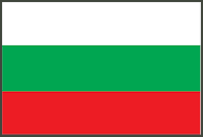Bulgaria
 Bulgaria is one of the oldest European States with 20-century-old history and traditions. Modern Bulgaria is situated in Southeastern Europe, in the Balkan Peninsula – a busy crossroad of ancient cultures. For centuries, the roads passing through the territory of the country have been connecting Europe with Asia and Africa. Four common European transport corridors, connecting West and North Europe with the eastern and southern part of the continent, cross their roads here.
Bulgaria is one of the oldest European States with 20-century-old history and traditions. Modern Bulgaria is situated in Southeastern Europe, in the Balkan Peninsula – a busy crossroad of ancient cultures. For centuries, the roads passing through the territory of the country have been connecting Europe with Asia and Africa. Four common European transport corridors, connecting West and North Europe with the eastern and southern part of the continent, cross their roads here.
Bulgaria is also known for its picturesque nature and rich cultural heritage. According to the statistics, the country ranks third in Europe only after Greece and Italy for the number of its valuable archeological monuments.
According to the 2001 census, the major groups in Bulgaria’s population were Bulgarians, 83.9 percent; Turks, 9.4 percent; and Roma, 4.7 percent. However, by 2006 the actual Roma population was estimated at more than 7 percent. The Turkish population is concentrated in the southeastern and northeastern parts of the country. Other ethnic groups present include Armenians, Circassians, Macedonians, and Tatars. Since the campaign of the Zhivkov regime to assimilate the Turkish population in the 1980s, the only ethnic issue of consequence is that of the Roma, who complain of discrimination and are regarded by some Bulgarians as second-class citizens. After the local elections of 2003, 3 percent of municipal council members were Roma, and the Roma were expected to make additional gains in the municipal elections of 2007. However, in the early 2000s no national parliament had more than two Roma members.
Bulgaria’s official language is Bulgarian, which is the first language of 84.5 percent of the population according to the 2001 census. Other languages spoken are roughly in proportion to the populations of the corresponding ethnic groups present: Turkish (9.6 percent), Roma (4.1 percent), Armenian, Circassian, Macedonian, and Tatar. As in the case of ethnic groups, the proportion of Roma speakers in the population is believed to be substantially higher than the census figure. A population of about 12,000 Gagauz along the coast speaks Gagauz, a Turkic language.
The Bulgarian cuisine is distinguished with its strong taste, numerous condiments and spices and variety of fresh vegetables, fruits, carefully prepared main dishes and desserts. Among the traditional Bulgarian specialties are banitsa, musaka with minced meat and potatoes, banska kapama, Thracian katma, cabbage or vine-leaf sarma, lukanka, sudzhuk, pastarma, shopska salad, Bulgarian white brine cheese and home-made yoghurt. Along with France, Spain, Italy and Greece Bulgaria is one of the biggest producers of wine in the world. The experienced connoisseurs distinguish the Bulgarian red wine sorts of Gamza, Pamid, Mavrud, Cabernet and Merlot and the white sorts of Muskat and Misket. The traditional Bulgarian aperitif is the rakia – grape or plum which goes with vegetable salad.
|
NEWSLETTER
|
| Join the GlobalSecurity.org mailing list |
|
|
|

